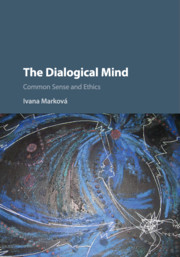Book contents
- The Dialogical Mind
- The Dialogical Mind
- Copyright page
- Dedication
- Epigraph
- Contents
- Figures
- Preface and acknowledgements
- Introduction
- Part I ‘Superior’ and ‘inferior’ thinking and knowing
- Part II Dialogicality as epistemology of daily life and of professional practices
- 4 Ethics of the Ego–Alter–Object relations
- 5 Epistemic trust
- 6 Epistemic responsibility
- 7 The dialogical mind in professional practices
- Conclusion to Part II
- References
- Index
5 - Epistemic trust
from Part II - Dialogicality as epistemology of daily life and of professional practices
Published online by Cambridge University Press: 05 August 2016
- The Dialogical Mind
- The Dialogical Mind
- Copyright page
- Dedication
- Epigraph
- Contents
- Figures
- Preface and acknowledgements
- Introduction
- Part I ‘Superior’ and ‘inferior’ thinking and knowing
- Part II Dialogicality as epistemology of daily life and of professional practices
- 4 Ethics of the Ego–Alter–Object relations
- 5 Epistemic trust
- 6 Epistemic responsibility
- 7 The dialogical mind in professional practices
- Conclusion to Part II
- References
- Index
Summary
Epistemic trust is an axiom of dialogical epistemology. It refers to the ethical relation between the Ego-Alter and has deep roots in daily life. Epistemic trust makes sense only in relation to its opposite, whether distrust, mistrust, doubt, risk or danger. I have explored two basic and mutually overlapping forms of epistemic trust/distrust. One form concerns the participants’ presupposition, or the lack of it that they live in a temporarily shared social world comprising a common ground for understanding and interpretation of their social reality. The other form refers to the capacity and readiness of participants (or the lack of it) to learn and accept knowledge and experience from one another. When established, epistemic trust is implicitly taken for granted, and it forms the common ground for understanding of the social reality, of common values and intentions to aim at ‘good life’. Epistemic trust is historically and culturally embedded and it ranges from micro-social to macro-social forms. The chapter discusses epistemic trust focusing on authority and positions of trust, on communicative contracts of secrets and non-disclosure, the hermeneutics of trust and the hermeneutics of suspicion. It shows some examples of complex relations of trust/distrust, such as the dialogicality of confession.
Keywords
- Type
- Chapter
- Information
- The Dialogical MindCommon Sense and Ethics, pp. 127 - 153Publisher: Cambridge University PressPrint publication year: 2016

